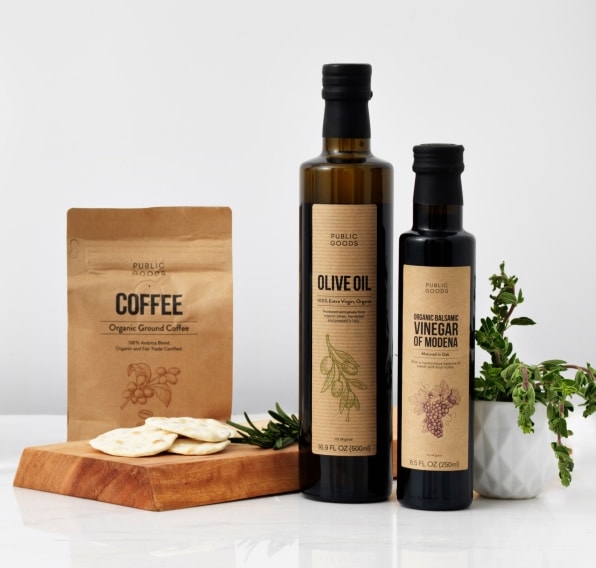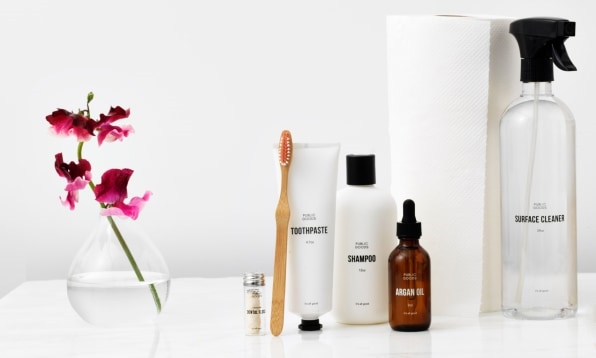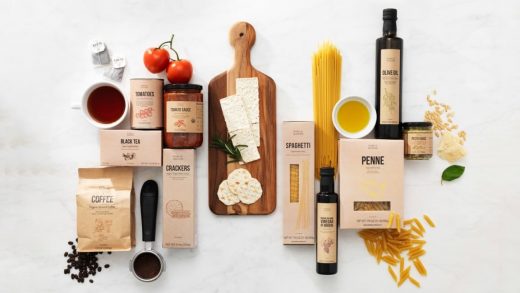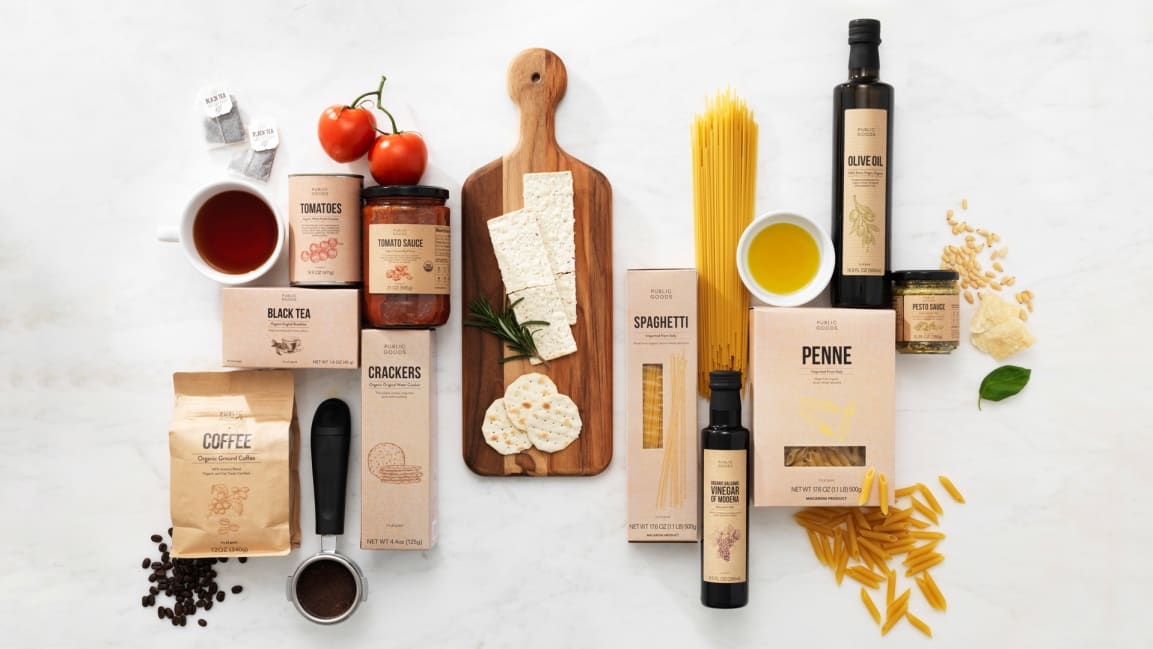This startup is Trader Joe’s meets Costco, with a splash of Brandless
What if you could Frankenstein together the low prices and variety of a Costco, the health consciousness of Whole Foods, with the quality and design of an Everlane?
Direct-to-consumer startup Public Goods does that by offering low prices for premium products by way of a $59 yearly membership. The Brooklyn company, which originally launched in 2015 as Morgans, was a hit with its line of clean personal care products; it then expanded to household goods free of harmful ingredients. And now, it has a new healthy food category.
Starting today, members can stock up on 60 organic products, ranging from extra virgin olive oil and balsamic vinegar to rosemary flatbread and split pea soup. Each week will bring more inventory, such as pasta, tuna, jams, and granola.
The startup’s perceived competitors aren’t necessarily the Dollar Shave Club or Brandless, explains founder and CEO Morgan Hirsh–they’re industry giants like Whole Foods, Sprouts, and Trader Joe’s.
“There’s that gap where people might want to buy [high-quality] products but just can’t access them,” says Hirsh, noting the need to service audiences beyond coastal elite cities.

A broader focus
Several years ago, Hirsh served as the CEO of Fullum & Holt, a Montreal-based leather goods manufacturer that supplied luxury retailers and brands across Canada, the U.S., and the U.K. It was then, like many other startup founders, that he witnessed the supply chain’s effect on pricing and how the direct-to-consumer space was ripe to offer more affordable solutions.
The era ushered in a number of companies dedicated to disrupting one specific category, like Dollar Shave Club’s razor subscription, or Thinx’s feminine hygiene collection. But that didn’t make sense to Hirsh, who found hopping between sites a tiresome experience.
“You were going to buy razors from one place, tampons from another, and then go to another website to get your dog food, and then yet another to get your vitamins,” he says.
Companies were so consumed with perfecting one product that they shunned entire categories. When they did add more items–beyond the hero products–they often hiked up the prices, leading to $10 shampoos.
The direct-to-consumer mission to drive prices down wasn’t exactly working for mass production, explains Hirsh. In launching Public Goods, he hoped to consolidate the experience and deliver value, rather than “the sort of unnatural unbundling we’re seeing with B2C startups.”
To do that, Public Goods established a membership model that could financially support a long list of products. Marketing costs often burden traditional B2C companies, and they need to make a large margin selling just one product. In contrast, a Public Goods membership offers a much broader assortment.
“The cliché, ‘The more you buy, the more you save,’ is actually true with us,” notes Hirsh.
The founder partnered with industry adviser Kim Greenfeld, a 20-year veteran of grocers such as Whole Foods, and in 2017 took his vision to Kickstarter. The fundraising goal was set to $20,000. Its mission statement was: Make healthy products affordable to all.
In under 40 days, over 10,000 fans backed Public Goods, raising nearly $700,000. Today, it remains in the top 0.2% of all Kickstarter campaigns.
Public Goods started “super scrappy,” says Hirsh, and began with a set collection of personal care products like paraben and sulfate-free soap ($3), naturally fragranced lotion ($4.50), and biodegradable bamboo toothbrushes ($4 for two). “[Personal care] was an easier category to start with, because with bathroom basics, there’s only about 10 products.”
Since that time, the company expanded into coffee, tea, household care, and travel products. In September 2018, the company raised $3 million in funding.
Because the company isn’t centered on one item, there are no real hero products. Public Goods boasts 107 SKUs, and about 10 of those compose 30% of all sales. “Once people buy into this membership model, they tend to want to purchase all of our products,” says Hirsh.
The company won’t release exact membership numbers, but a rep says it’s in the “tens of thousands.” In the last year alone, Public Goods say its sales grew over 600%. It finds most success in cities outside of L.A. and New York City, which already have plenty of high-quality grocery stores.
Basically, it resonates with consumers in suburban or rural areas without a neighborhood Whole Foods. “These are smart people who start eating healthy, want to be more conscientious in the way they purchase . . . but don’t want to pay an arm or a leg for it,” says Hirsh.

Reclaiming the bathroom cabinet
While most personal care and household items come cluttered with one too many labels (“kills 99% of germs!”; “anti-bacterial”; “sulfate-free”), Public Goods opts for a sleek, minimalist design reminiscent of Glossier. Bottles are either clear or white, featuring just the brand name, the product purpose, followed by the number of ounces in small lettering. It’s clean and pure, and perhaps the exact opposite of whatever dish soap now sits by your sink.
“[Traditional] CPG products aren’t designed with the home in mind at all,” declares Hirsh, noting that most brands opt for garish wording to compete on store shelves. The beauty of bypassing brick-and-mortar is that it can be designed purely for the home.
“We didn’t need to put all kinds of fake promises or flashy design on the bottles because I just don’t think that actually looks nice once you bring it out of the Duane Reade,” he explains. “It’s a lot like bringing a billboard or an advertisement and putting it into your bathroom.”
(Hirsh recalls his girlfriend coming home with a drugstore shampoo labeled with “for limp, lifeless hair.” He couldn’t believe he’d have to share the shower with such “an awful message.”)
In many ways, Public Goods sounds a whole lot like Brandless, the online retailer where every single product costs $3. Although they launched around the same time, Hirsh isn’t keen on the comparison. He holds that Brandless, for all their success, is too centered on achieving a single price point. That laser focus makes it hard to deliver on quality, especially in categories that require more natural, healthier, or ethically sourced ingredients, he says.
“What happens when you ask [manufacturers and producers] to be restricted to a single price point is that ultimately, you end up cutting corners on quality,” says Hirsh. “We wanted to make sure the quality was at the forefront, and by offering memberships, we could actually deliver better value in that way rather than just saying, okay, we’re going to make everything cheap.”
(Brandless, for its part, sells dozens of products that are paraben-free and certified organic.)
The majority of Public Goods products range from $3 to $5, with the pricier items restricted to organic Fair Trade coffee ($6.50), laundry detergent pods ($6.95), and 100% organic Turkish cotton bath towels ($36).
Public Goods’s foray into edible products further accomplishes its goal to, as much as possible, consolidate online home shopping. It certainly won’t stop there. The company is already eyeing more categories that customers repeatedly request, like babycare items, feminine hygiene, and vitamins.
“We’re focused on anything people really need,” says Hirsh. “We want to be a brand that encompasses all of the essentials that people need and use every month.”
(42)



